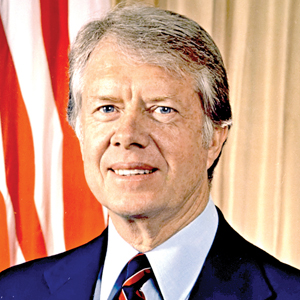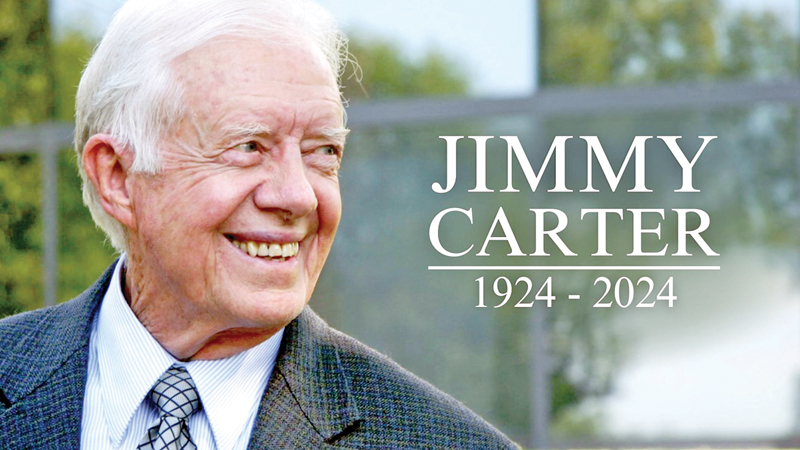Former US President Jimmy Carter, who died aged 100, achieved a far more favourable reputation after leaving the White House than he ever secured during his single term of office. Following his electoral defeat in 1980 – when Ronald Reagan beat him by 489 to 49 electoral college votes – his sustained efforts to improve life for the deprived people of the world won him the 2002 Nobel peace prize.
Carter left a mixed heritage from his Presidential term. He put human rights firmly on the international agenda, persuaded Congress to cede US control of the Panama Canal, demonstrated that peace settlements could be achieved in the Middle East, and completed the second strategic arms limitation treaty with the Soviet Union.
But he was not cut out for the White House. He became the 39th President because he was not Gerald Ford: he was ousted after one term not only because of his administration’s inept handling of the Iranian hostage crisis but because he was overwhelmed by the job.
He eventually retrieved his reputation by founding the Carter Centre in his home state of Georgia and embarking on a vast range of activities designed to defuse international conflict and to introduce democracy and a decent standard of life across the globe.
Disparate projects
 This took him to countries ranging from Zambia to Peru and from Sudan to Guyana, for such disparate projects as mediating in civil warfare, encouraging sustainable agricultural development, establishing a proper judicial system, or installing a clean water supply. He became a familiar figure at election counts around the globe, part of the international team that sought to ensure that where skullduggery could not be prevented, it was at least well publicised.
This took him to countries ranging from Zambia to Peru and from Sudan to Guyana, for such disparate projects as mediating in civil warfare, encouraging sustainable agricultural development, establishing a proper judicial system, or installing a clean water supply. He became a familiar figure at election counts around the globe, part of the international team that sought to ensure that where skullduggery could not be prevented, it was at least well publicised.
With the agreement of the Clinton administration, in 1994 Carter took up an invitation to visit Kim Il-Sung in Pyongyang, and out of their talks came the Agreed Framework, by which North Korea undertook to suspend its nuclear weapons program in return for increased energy aid from the US.
Initial progress was not sustained, and by 2003 relations between the two countries were openly hostile again. In 2008 he was criticised in the US and Israel for urging peace talks involving Syria and Hamas. In August 2010 he returned to North Korea to secure the release of a US citizen, Aijalon Gomes; he visited the country again in 2011.
Carter acknowledged that much of the energy he brought to the Carter Center had stemmed from the unexpected frustration of his presidential career. “I don’t think that if I had had two full terms in the White House, I would have launched so ambitious a new career. I would probably have become a professor and written some books.”
Born in Plains, Georgia, Jimmy (James) was the eldest of four children of Lillian (nee Gordy), a nurse, and James Carter, a peanut farmer. He planned a Naval career, graduating from the US Naval academy in 1946. Then he became involved in the design and development of nuclear power for ships, and later with training seamen to serve in them.
In 1953, however, the death of his father obliged him to resign his commission to take control of the family business. This sparked an interest in politics and, in 1962, he was elected a State Senator. At the end of his four-year term, he ran unsuccessfully for the governorship of Georgia. In 1970 he was elected at his second attempt and began to plan his Presidential campaign.
His ambitions coincided with the Watergate scandal and the enforced resignation of Nixon in August 1974. Ford, a Republican Congressman from Michigan, had been hand-picked by the beleaguered incumbent as his successor. The electorate, initially neutral about the Constitutional niceties of this procedure, erupted in fury when the newly sworn-in President Ford announced an unconditional pardon for his patron. The stage was thus set for Carter’s bid, on the basis that he did not belong to the Washington establishment and that he espoused the simple moral and religious values that the electorate was then seeking.
In the 1976 primaries he easily outpaced his Democratic rivals. But his Presidential victory was uncomfortably narrow: he won only 23 of the 50 States and secured less than half the popular vote (excluding Washington DC). His arrival in the White House arose more through the quirks of the electoral college, where he predominated by 297 votes to Ford’s 240.
His election showed plainly what became even more starkly evident as his term progressed: that support in the country was marginal and could be eroded by almost any setback. The honeymoon lasted long enough domestically to get the Panama canal treaties ratified in 1978 – no small achievement – and internationally to bring Israel and Egypt to a widely applauded peace settlement in 1979, brokered by Carter.
It might have been easier had Carter arrived with a clear political agenda, but he seemed geared to the politics of symbolism rather than substance. In an effort to focus his compatriots’ attention on their profligate use of energy, he addressed the nation wearing a cardigan, which simply drowned the message in derision.
Waning popularity
It had become evident to the country that its Chief Executive was becoming impotent through his insistence on bogging himself down in detail to the extent that he even insisted on drawing up the playing rota for the White House tennis courts. With his popularity waning steeply, particularly after a disastrous television address in which he seemed to saddle the nation with his own uncertainties, Carter was hit by the twin crises that doomed his Presidency – the Soviet invasion of Afghanistan and the fall of the shah of Iran.
Long after he left office, it emerged that much of the blame for the Afghan crisis could, in fact, be laid at his door. In February 1979 the US Ambassador in Kabul, Adolph Dubs, was kidnapped and died in a botched rescue attempt by the local police. The Soviet Union was alleged to have been behind the kidnapping and, in retaliation, Carter signed a secret directive on July 3, 1979, authorising the CIA to fund and arm Muslim opponents to the Kabul regime, which the Soviet Union supported.
This decision was later described by Carter’s national Security Adviser, Zbigniew Brzezinski, as “Giving the Soviet Union its own Vietnam”. Its consequences, including the rise of the Taliban, have clanked unpredictably through the ensuing decades. As US-funded fighting spread rapidly across Afghanistan, the Kabul regime tottered and Moscow decided that the only answer to the destabilisation of its strategically vital southern border was to invade.
Carter, already in deep trouble over the fall of the shah, responded to the Soviet invasion by shooting himself in the foot. With domestic political attention focused on the impending 1980 Presidential campaign, he announced an embargo on a portion of US grain exports to the Soviet Union, the prime victims of which were America’s midwestern farmers rather than the USSR.
He did manage to see off the internal party challenge of Senator Edward Kennedy, but slipped badly in the broader race for re-election. He had been unlucky in inheriting the brewing Iranian crisis, but he handled that no better. The Shah was entirely the creature of successive US administrations. It was, therefore, self-evident that the dethroned monarch would turn to his patrons in his final crisis and that, conversely, the new Iranian regime would stoke the anti-Americanism built up by his autocratic reign.
Repeated warnings
The US Embassy in Tehran sent repeated warnings of the likely Iranian reaction if the terminally ill Shah was allowed into the US, but they were ignored by the White House. Within three weeks of his arrival for medical treatment, the Embassy had been seized and 53 of its staff held hostage.
A bad situation was made far worse by an ill-conceived and ultimately disastrous attempt to mount a rescue operation. Its chances of success were always slight and were wholly nullified by the combination of equipment failures and excessive interference from above.
Had Carter been held in greater confidence by his countrymen, they might have had more sympathy for his dilemma.
He had nothing to bargain with, and it became evident that for Ayatollah Ruhollah Khomeini, the fundamentalist Shia cleric who had overthrown the Shah, the crisis had become a personal contest. He released the American hostages only at the moment when Carter was succeeded by Reagan.
Carter’s political ambition far outreached his experience or capacity, but his brief sojourn in the Oval office at least gave him the international standing to carry out the humanitarian work for which he will probably be best remembered. With his wife, Rosalynn (nee Smith), whom he married in 1946, he visited more than 140 countries.
He wrote 30 books, including A Call to Action (2014), which addressed discrimination and violence against women, and A Full Life: Reflections at Ninety (2015). Having turned 100 last October, he fulfilled his aim of voting in the presidential election. (The Guardian)









